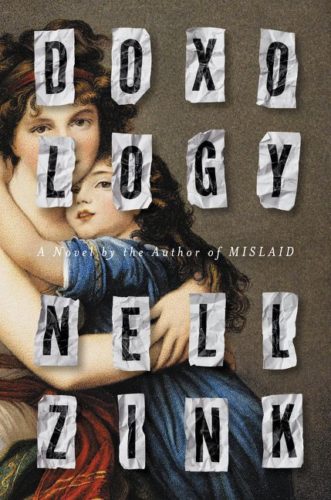Book Review: Nell Zink’s “Doxology” — Not Eccentric Enough?
By Drew Hart
Nell Zink’s latest novel is vast, aspiring to epic stature — it’s a curious take on the times that have befallen us.
Doxology by Nell Zink. Ecco 416 pp.

My Protestant upbringing recalls the part of the church service when the organist would start to play a serious, rumbling passage and everyone would rise, knowingly, to sing the short song of praise known as the Doxology. It’s not clear whether Nell Zink’s new outing is a similar kind of ritual — for one, it isn’t short.
There may be a similar degree of seriousness in Doxology, although it’s dedicated to a cat. I have always thought the earlier books Zink has written — especially her first, The Wallcreeper, which centers on birdwatching, Germany, and general scatteredness — put the so-called fun back in “dysfunction,” and I have approved heartily. Here there may be loftier ambition: this story spans a lot of our recent miasma-like past, following an extended family of New York and D.C.-based creative-class folks from the grunge-filled ’90s on the Lower East Side, through 9/11, on into the new millennium, and all the way past the what-to-make-of-it election of 2016.
Your narration here is omniscient — it veers from one character to another. One is a Kurt Cobain–type genius music star, who’s shockingly killed off by an overdose. We also spend time with his manager and his best friend — the two are married. And perhaps above all, though this is subject to debate, the most central player is a woman named Flora. She is born to the couple mentioned above, and we track with her, intermittently, from precocious childhood all the way to her own out-of-wedlock motherhood — there is a triangle-like situation — in a not far from now future in Washington, where some kind of airborne toxic event is threatening the capital.
So there is a vast, aspiring to epic, superstructure contained in this undertaking — it’s a curious take on the times that have befallen us. As usual, Zink peppers her story with zingers and soundbites that are at least hoots, and are sometimes glorious. The funny part about Doxology, though, is that while you are being escorted past all the momentous doings of the era it’s chronicling, you find yourself longing for less, and not more. I’m not sure who I want to see document our recent past — I just don’t think it’s Nell Zink. (Maybe not Jonathan Franzen, her reported mentor, either.) She’s so fabulous expressing an eccentric mindset, and I wish she would stay in that mode. Here she’s stretching to build a convincing plot, with romantic and political complications — the superstructure isn’t always that convincing. Your mileage may vary; you in all likelihood will not be bored.
Drew Hart is from Santa Barbara, California.
